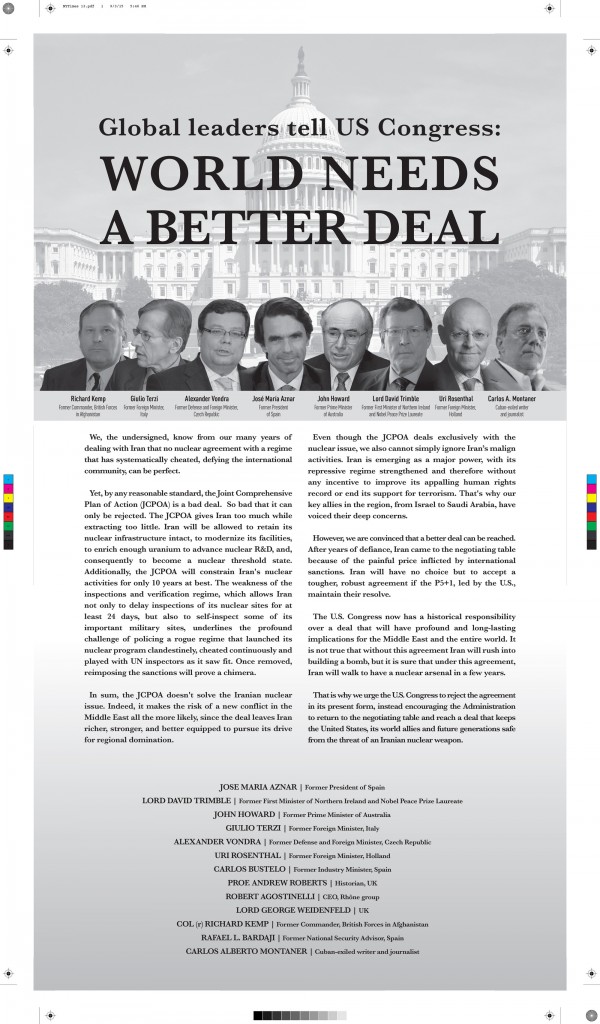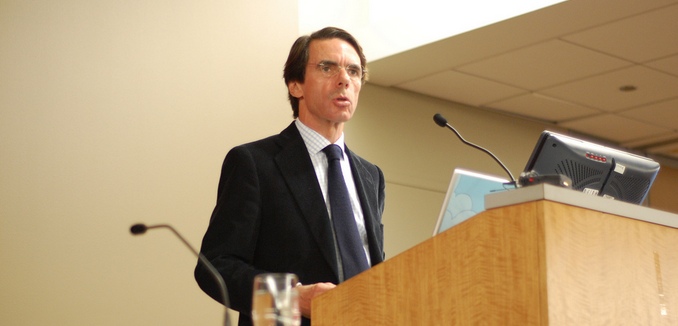The Nobel Peace Prize-winning former First Minister of Northern Ireland and the former Prime Minister of Spain called on Congress to reject the nuclear deal with Iran in an op-ed published Tuesday in The Hill.
David Trimble and Jose Maria Aznar argued that the deal, formally known as the Joint Comprehensive Plan of Action (JCPOA), merely postpones Iran’s nuclear ambitions without curtailing Iran’s “malignant activities.”
First, the JCPOA, does not dismantle Iran’s nuclear program; it pauses it. Under the parameters of the JCPOA, Iran is allowed to enrich uranium, to carry out R&D on advanced centrifuges, and to keep its nuclear infrastructure intact. All of the steps Iran agreed to take in return are reversible. When the deal expires, Iran will be a nuclear threshold state, capable to make a nuclear bomb in weeks more than months, and Iran will be better prepared to defend its facilities thanks to the lifting of the arms and ballistic missiles embargo and other measures adopted in this current agreement.
The JCPOA does not include an optimal system for compliance, monitoring and verification. Though Iran has a long history of violating UN Security Council resolutions, the inspections will not be “anywhere, anytime,” and the snapback provisions for sanctions are ineffectual. That the deal ignores the past military dimension of Iran’s nuclear program only encourages Iran to cheat even more in the future.
Trimble and Aznar observed that the JCPOA seems to “rely on the naïve believe that the Iranian regime will moderate after sanctions are lifted.” But in the 1990s, when Europe increased commercial ties with Tehran, the Iranian regime used their newfound wealth “to fund terrorism, an illicit nuclear program and violent repression at home.”
Rejecting the deal, Aznar and Trimble argued, could allow the West to renegotiate the deal to address its deficiencies.
Nonetheless, there were red lines that, if followed, would have turned this JCPOA into a better deal: Stop enriching uranium, create a more robust verification and inspection process, restrict R&D research on advanced centrifuges, take back all the calls for Israel’s annihilation, close or reconvert all nuclear facilities; stop promoting terrorism around the world; stop funding Hezbollah and Hamas, and carry out several commitments regarding human rights. Most of these critical issues should be incorporated and discussed in a new deal with Iran.
They stated that a better deal that “would offer our citizens stronger guarantees that Iran will never become a nuclear state nor have the ability to increase their funding of terrorism around the world” would be welcomed by European leaders. They concluded by noting that “Congress is facing now an historic moment: a moment to repeat the mistakes of the past, or to work for a better future. In order to avoid the former and strengthen the latter, Democrats and Republicans in Congress should join forces and say no to this bad and dangerous agreement with Iran.”
Aznar and Trimble are both members and founders of the Friends of Israel Initiative, a group of statesmen who support Israel’s right to exist. The group published a full page ad opposing the nuclear deal in Tuesday’s edition of The New York Times.

[Photo: bradleypjohnson / Flickr ]




